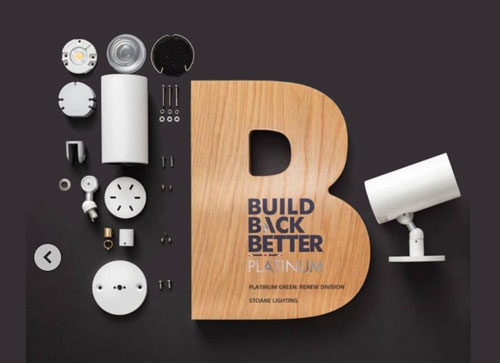Circular lighting projects triumph at 2023 Build Back Better Awards

A raft of lighting projects where lighting has been reused has taken top honours in the lighting category of the Build Back Better Awards 2024.
It was an unrivalled year for Green awards, with a total of 13 awarded, reflecting significant investment in sustainability by the lighting industry in recent years. Schemes rated included ones in the UK, USA, Norway and Denmark.
• Building Crafts College in London by Silent Design won Gold and Green awards for reusing 300 linear metres of luminaires from a separate commercial office building in central London.
• The reuse of luminaires at Arup’s Manchester office won a Green. Arup teamed up with luminaire remanufacturing business The Regen Initiative to reuse the lights in a major refurb of its lighting. The fluorescent gear and lamps were replaced with LED modules and drivers, and some additional luminaires were repurposed from a Category A fit-out office in Leeds, which would otherwise been disposed of.
• The lighting of the Entopia Building in Cambridge also won a Green. Some 350 luminaires removed from a London office fit-out were reused in the exemplar sustainable building for Cambridge University. BDP upgraded and reused the lights in the transformation of a 1930s telephone exchange in the £12 million project to create a new headquarters for the Cambridge Institute for Sustainable Leadership.
• Senate House Steps at the University of London Senate also took Green for BDP. The fully flexible and demountable architectural installation is a symbol of opportunity and a new place for students at the heart of the university estate, also encouraging use by the wider community. The lighting design promotes the circular economy by using specified Ecosense luminaires which were upcycled from existing stock.
• A ground-breaking graphical guide to avoiding light pollution was awarded both Platinum and Green. The Good Lighting Technical Advice Note for Cumbria, UK was developed by Dark Source.
• The Regen Initiative, a lighting fixture refurbishment service, won both Platinum and Green. It’s designed to breath new life into existing fixtures, all while sourcing from localised supply chains in line with circular economy principles, with carbon reduction being a key factor of success. Conceived by F Mark and Coco Lighting, and now partnered with Eco Fix UK, the Regen Initiative aims to work together collaboratively to provide more efficient lighting that stands the test of time, to challenge the status quo and to strive to provide solutions without sacrificing quality or compromising on safety or ethical standards.
• TM65.2, the lighting version of Cibse’s Technical Memorandum 65 for embodied carbon in products, won both a Platinum and a Green. The lighting edition of TM65 – a widely-accepted metric for measuring embodied carbon – includes new materials, special definitions and acronyms from the lighting sector and product case studies from 18 luminaire manufacturers.
• The Espenes Rest Stop – a ‘destination experience’ by the Norwegian Scenic Routes’ initiative – won both Platinum and Green. The building seamlessly blends nature-inspired aesthetics with intelligent lighting design to create a landmark that subtly enhances its environment while respecting its essence. The horizontal line of the water, the peaks of the surrounding mountains and the wind conditions all informed the distinctive geometry of the roof. The lighting design by Light Bureau is similarly inspired by the place and the surroundings; the cool moonlight that illuminates the mountain tops and the nearby glacier in contrast to the warm light of fire.
• The roll-out of a Central Management System for the London Borough of Haringey’s 25,000 street lights won both a Gold and Green. The local authority selected the cloud-based EXEDRA platform from Urbis Schréder to optimise energy use and configure the street illumination at a local level in real time. It follows the publication in 2021of ‘Haringey Climate Change Action Plan’ to deliver a route map towards Net Zero Carbon for the council by 2027.
• In the product category, Italian brand Lorelux took Gold and Green for its range of range of street and urban lights made from post-consumer plastic waste.
• Bell Lighting took a Green award for its Firestay Sustainable Geo fire-rated downlight. The luminaire has a housing which is designed to remain in the ceiling for life, as any replacement of the light engine doesn’t require removal of the housing. The Geo-Mod® light engine enables the user to replace the CCT LED unit at the end of product life, with the module designed to be returned to a local Bell Lighting collection hub such as an electrical wholesaler. Bell says that in turn, 90 per cent of all material returned will be re-used and re-manufactured.
• The Aeromax standalone solar-powered luminaire and energy storage system by Acrospire won a Green. Developed with its partner Green Frog Systems, the Aeromax harnesses solar power during the day and stores it for use during nighttime hours. It features advanced solar harvesting and energy storage capabilities with an efficacy of 194 lm/W.
On one charge it can provide continuous illumination for up to 15 days autonomy without additional charge from the sun. It is also capable of power additional devices such as CCTV and Smart City sensors and controllers.
• ReCinder, a project to create light made from waste coal ash, won a green for product designer Rosy Napper. Napper, a ceramic specialist and a graduate of the Central Saint Martins art school in London, created a series of luminaires made from waste coal ash and discarded ceramic. She says that the recycled material has a unique translucent quality.
• See all the winners at www.buildbackbetterawards.com


